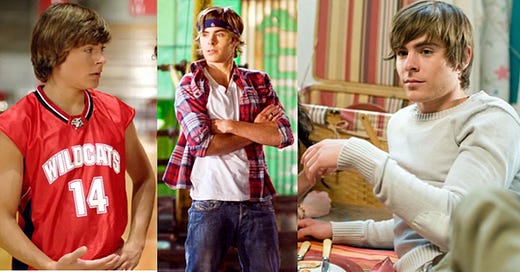Troy Bolton is Camp
because Susan Sontag says so, definitely not because I’M projecting anything.

Troy Bolton is camp, because Susan Sontag says so, definitely not because I’M projecting anything.
Or, how to like the High School Musical franchise in a way that’s not only fine for an adult, but actually queer and intellectual.
"Camp is a tender feeling,” Sontag writes in her famous “Notes on Camp,” and anyone who has known me between the ages of 11 and 25 knows that I am embarrassingly, proudly, incorrigibly consumed by a tenderness for Disney’s High School Musical movies (2006-2008). I’ve watched them roughly 3 million times. I’ve subjected friends, family, and even Gender Studies classrooms to the movies and the overwrought gay scaffolding I’ve built around them in my mind. “To talk about Camp is therefore to betray it,” and yet I do it anyway—must do it—will continue to do it.
“For Camp art is often decorative art, emphasizing texture, sensuous surface, and style at the expense of content.”
“Camp refuses both the harmonies of traditional seriousness, and the risks of fully identifying with extreme states of feeling.”

High School Musical’s campiness is the feeling of being riven from the inside by something’s sheer commitment to style, being gutted by the aesthetic and emotional extravagance of something as seemingly insignificant as a summer talent show.
Notes for the uninitiated: The High School Musicals are about a high school in Albuquerque with a seemingly boundless budget and energy for musical numbers. They are about the scandal—the cosmic impossibility!—of being a basketball player who also sings. They are about a living Barbie named Sharpay, who drives a pink Mustang with a license plate reading “FABULUS,” and her gay lapdog/brother Ryan who we sometimes have to think is straight.
At East High, high school is indeed full of “extreme states of feeling,” and the range of feelings is as follows: pink, red, ambition, fabulousness, Julliard, and devotion to your fellow heterosexual bros.

(Basketball is a form of dance, right?)
“Behind the ‘straight’ public sense in which something can be taken, one has found a private zany experience of the thing.”
“Pure Camp is always naïve.”
I could write weekly installments about the crackling homoeroticism constantly commandeering HSM’s officially hetero plot (see the above picture), but I will spare you and relate my favorite instance. There is nothing more insane than the seriousness of the following encounter in High School Musical 2:
Troy finds Ryan—the ornately queer-coded character who literally just finished a song-and-dance flirtation with Chad and 20 other dudes on a baseball diamond—dancing and laughing with his girl Gabriella. Ryan, oblivious to the territorial grunting that Troy is attempting, says “Her mom makes the best brownies in the entire world.” Troy cuts him off, his elvish features vibrating with masculinity, “I KNOW. I’ve had them!”
Just two dudes caught in a conflict over access to this girl’s mom’s brownies. Eve Sedgwick, Between Men, hello!
“A state of continual incandescence – a person being one, very intense thing”
“The androgyne is certainly one of the great images of Camp sensibility”
I’ve barely started on Troy Bolton, my most tender feeling and the most sensuous surface of the three movies. Perhaps I am afraid of betraying him, or betraying myself.
Here are some of my notes on Troy: Troy is a collection of three-quarter sleeve baseball t-shirts. Troy is an endless expanse of smooth skin and lightly highlighted hair. Troy is a jock who looks gentle and afraid at all times, whose toughest bark is “I know…I’ve had those brownies!!” Troy dresses like Shane McCutcheon to go dance in the junk yard.
There is something utterly gay about the tenderness and timidity of Zac Efron’s performance of Troy’s masculinity, a fact searingly punctuated by the Efron’s later ascendance to fratboy beefcake status.

Troy is the campy androgyne, a creamy blank-slate of hairless incandescence gesturing in the general direction of masculinity. He is the white t-shirt which, worn in a certain way, variously signifies trans masculinity, butchness, and general foppishness.
Troy is the sole reason I own as many three-quarter sleeve baseball t-shirts as I do (in a campy way, I cry!), though they do not look good on me and now belong to my girlfriend.
Troy Bolton is the smooth surface of the well-bound boi I wish I was. And that is the tenderest feeling of all to betray.
Sedgwick: “Camp-recognition doesn’t ask, ‘What kind of debased creature could possibly be the right audience for this spectacle?’ Instead, it says what if: What if the right audience for this were exactly me?”
Sontag: “Camp is the answer to the problem: how to be dandy in the age of mass culture.”




